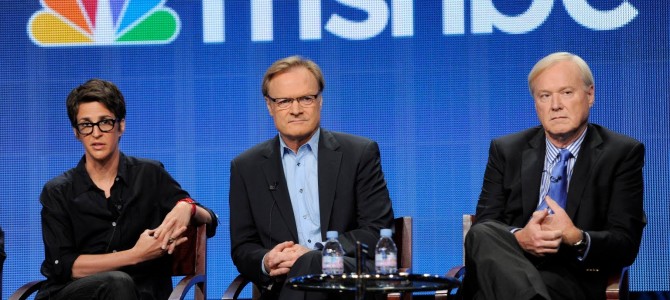As much as it pains me, let me take a few moments to defend MSNBC. Last week’s much-talked about testy exchange between anchor Thomas Roberts and Republican National Committee Chair Reince Priebus has been predictably negative. Media bias is a perpetual grievance of the Right — for obvious reasons. But maybe the only way to improve on the situation is to champion more openly ideologically driven political journalism? By any measure, it’s a lot less destructive than what we had for decades: a media feigning impartiality.
Here, of instance, is a taste of Roberts questioning Priebus:
But why do we need to attach the solutions or changes that go along with the law that has been vetted by the Supreme Court, by a mandate by the people reelecting the President and both houses of Congress. Why should that be attached to shutting down the government and as the President is saying basically writing a ransom note and asking for some type of goody bag in response to Congress doing its job to govern?
It can be uncomfortable watching a head-on collision of hackery, but the truth is the entire exchange is weirdly honest, entertaining and informative. It’s not often a TV anchor admits to viewers that he’s reading “directly from what the president just gave us.” Roberts is standing in for the president. Perfect. It’s not as if Reince Priebus was on MSNBC to offer his dispassionate impression of the situation, either. He should be challenged. And though the table-setting question is preposterously biased, it’s exactly the kind of question Priebus should be able to deflect. And he gets to do it in front of an audience that generally detests Republicans. I saw many people on Twitter wondering why Priebus does it to himself. They should be wondering why he doesn’t do it more often.
We all know where MSNBC or FOX News stand. It’s establishment media masquerading as impartial that has the real impact. This bias is rooted in insularity, showing a lack curiosity about the other side’s worldview — the ignorance about religion, guns or free-market economic ideas are the most glaring example — and, even worse, a lack of skepticism towards its own conceptions about how things work.
To the untrained eye, the Obamacare rollout may seem like an unmitigated disaster. But editors at Reuters (“Web traffic, glitches slow Obamacare exchanges launch”) or the Associate Press (“Rollout of ‘historic’ Obamacare in California hits some snags”) will try to dissuade people of this notion. Bias doesn’t only manifest in what you write but what you don’t, in what goes above the fold and what sort of delicate nouns and adjectives you sprinkle in your headlines.
And since Obamacare was a bit, you know, glitchy, the media’s struggled to find someone who could make the federally run health-insurance rollout a success story. They came up with Chad Henderson, a 21-year-old part-time child-care worker and conscientious son. The kind of person Obamacare we’re supposed to believe it can really help.
Now, reporters are clogging Henderson’s voicemail, pro-Obamacare forces are holding him up as a poster child of the health law and administration officials are giving him shout-outs on Twitter.
As the Washington Post reported, “Meet Chad Henderson, the Obamacare enrollee tons of reporters are calling” (penned, incidentally, by the reporter who believes Kermit Gosnell was a mere local crime story). “I haven’t had health insurance for 14 years,” Henderson told the Post. “My dad put me on BlueCross BlueShield, but the premiums kept rising, and we dropped it since he wasn’t making that much.” What the author, much less any editor at the Post, won’t ask is: ‘Wait, doesn’t this guy sounds like he’s full of crap?’ or ‘Hold on, do we believe his claims about affordability’? or ‘Hey, why don’t we hound one the thousands of people who failed to enroll?’
The entire story turned out to be bogus. But it took Peter Suderman, at libertarian Reason — a place where, we imagine, the ideological sensibilities of the staff are naturally skeptical about feel-good collectivist enterprises — to debunk every angle of the story. We’ve seen bloggers, partisans and political magazines doing the same for every year. But you have to wonder how many Chad Hendersons get away with it.
The establishment media could, of course, hire more ideologically diverse staffs to fix this problem. There could have been a Suderman at the Post. But liberals have had a near-monopoly on the institution of journalism for decades and monopolies aren’t easily surrendered. For years I worked at a decent-sized newspaper, in a purple state, and I knew of maybe three conservatives (a copy editor, a production person and a sports editor) and one libertarian (a feature writer) in what was, at one point, a 200-person newsroom. There were many professionals who took their craft very seriously, many who broke important stories, many who were immensely talented, but very few who weren’t biased to some extent.
Having a point of view doesn’t preclude a political journalist from being honest or curious or a critical thinker (though, after hearing Thomas Roberts’ confused understanding of lawmaking, it’s obviously not mandatory), but journalists believe, or act as if they believe, that their work is immune from ideology. With few noteworthy exceptions, of course, that’s impossible. And that’s fine. The key to making it work isn’t impartiality; it’s diversity.









